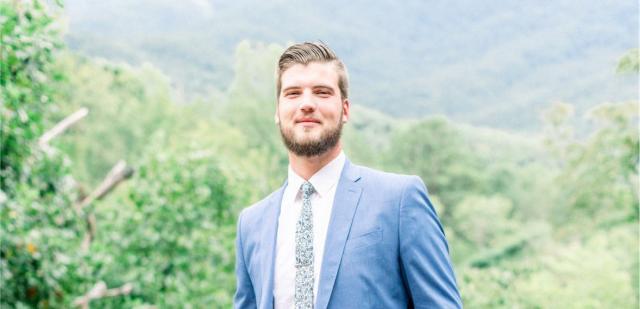
(John Johnston / United Way of Greater Cincinnati 2022)
Rural Works Employment Program Takes Root in Southeast Indiana
LAWRENCEBURG, Ind. (January 31, 2022) -- A year ago, the odds were stacked against a young married couple from Southeast Indiana. After completing the Dearborn County Jail Chemical Addiction Program, they were living in separate halfway houses, apart from their children. They needed help getting their careers and their lives back on track.
First the husband, then his wife, enrolled in Rural Works, a poverty-to-self-sufficiency program run by River Valley Resources Inc., a United Way of Greater Cincinnati community partner. In the months that followed, the husband found a job that pays a sustainable living wage. His wife got a part-time job and applied for schooling. They received a variety of assistance and moved into their own rental home. Best of all, they were reunited with their children.
Austin Clark expects many similar success stories to come from Dearborn County’s Rural Works, which launched in January 2021 when he was hired as its career coach. Funding to establish and sustain Rural Works came from United Way ($70,000) and the Dearborn Community Foundation, which received a $100,000 grant from Lilly Endowment Inc. The foundation then matched that with a grant from the Lawrenceburg Community Grant Program.
This interview with Clark was edited for brevity and clarity.
###
Question: What is Rural Works’ mission?
Answer: The main mission is to assist individuals to achieve financial self-sufficiency through skills training and employment.
Q: How does it work?
A: We model Rural Works after Cincinnati Works (also a United Way partner). There are four parts: First, job readiness. We do a three- to five-day skills workshop with clients to identify their skillset and the direction they want to go in the workplace. Second is the job search. I work with them one-on-one as their career coach to provide assistance with job applications using the resume that was created in the workshop. Once they are placed, if they want to keep working with me, the program has two more parts: job retention and job advancement, both of which can involve exploring educational opportunities. Our main goal isn’t just to get clients into a job, it’s to get them into a position where they can grow their career and skillset, and advance.
Q: What agencies refer individuals to you?
A: Community Mental Health Center in Lawrenceburg; Jail Chemical Addiction Program; 1Voice Recovery; probation, parole and other court services.
Q: How do you connect people to employers?
A: I have a list of community partners I stay in contact with. I let them know when I’m holding classes and the participants that potentially could fill their open positions. Those are core employers of the program.
Q: Once someone gets a job, then what?
A: We do regular check-ins with the employee. I also check with the employer to see how everything is going. The overall goal is to get people placed in a position where they stay at least a year.
Q: Besides helping people find jobs, what else is involved?
A: A lot of other things must be taken into consideration. For example, if someone comes in and wants to get a GED before working with me, I’ll refer him or her to a different River Valley Resources program. That will make him or her a better candidate for employment, and later they can circle back to me. I also help people with things like budgeting techniques and financial literacy.
Q: In 2021, 30 individuals were referred to Rural Works, some of whom were directed to other community services, while eight people completed Rural Works’ job workshop. What are the goals for 2022?
A: 2021 was getting it off the ground, letting the community know what we’re doing and how we can impact employers and people looking for work. In 2022, we want to increase the number of people getting services from Rural Works.
For more information, visit the Rural Works Facebook page: www.facebook.com/rvrruralworks. Or email Austin Clark at [email protected].